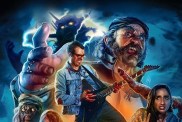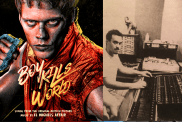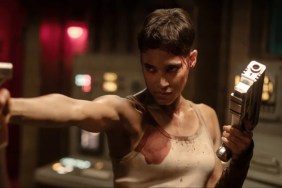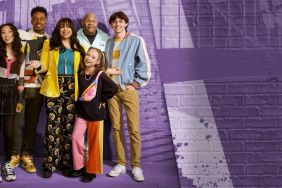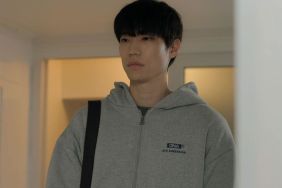It’s been seven years since filmmaker James Gray’s last movie The Yards hit theaters, but unswayed by that film’s lack of commercial success, he recast that movie’s leads Joaquin Phoenix and Mark Wahlberg for his new police drama We Own the Night. With both actors having earned a lot more cred in the past few years thanks to well-deserved Oscar nominations, they were brought back to play brothers on opposite sides of the law in 1988 Brooklyn: Phoenix is Bobby Green, the smooth-talking manager of a popular Russian nightclub where criminals and drug dealers converge, while his brother Joseph is a police officer, who hopes to follow in the footsteps of their chief of police father (Robert Duvall), even though it might mean dragging Bobby down with the bad guys.
It’s an amazing story about the New York police of the late ’80s that bases itself very much in the relationship between these two brothers and their father, and yet it’s some of the most exciting and masterful crime storytelling since last year’s The Departed. A New Yorker through and through, Gray has created a riveting look at the times, and ComingSoon.net learned more about what went into creating this film when we talked to Gray on the phone from the L.A. junket for the movie.
ComingSoon.net: It’s definitely been some time since your last movie.
James Gray: Yes, it has.
CS: Is it just that it takes you a long time to write and develop your scripts before you shoot anything?
Gray: Yes, that’s essentially it. I mean it’s very hard to make films. I like to say that if you want to go to dinner with three or four friends of yours, how impossible is it to just decide where you want to eat, let alone getting a hundred people together to spend $20 million and years of their lives? It’s a very complicated undertaking and the system is really built to make films it wants to make, which means films that are not by writer/directors. Because of these reasons really. Also I was ready to make the film, but Joaquin was not a big enough name until after “Walk the Line” in order to get the picture off the ground. Once he became a big enough name, that’s when the movie really started to come together.
CS: Had you written the part for him, having worked with him on “The Yards”?
Gray: Yeah, I had. I loved both him and Wahlberg, they’re both great, so I had wanted to work with them again because they have such sensitivity and emotionality, I just love them.
CS: It’s amazing that you stuck to your guns on this project for so long. Did you write other things during that time while you were waiting to make this?
Gray: I’ve been focusing on this. The truth of the matter is that I’m not an old man yet, and I don’t want to give up on my dream to make movies I care about. It would be very easy for me–I shouldn’t say “easy”–but it would be easier for me to go off and do something that the system wants me to do in a way, a director for hire, but then what’s the point of making films at that point? I may as well just become an investment banker or something.
CS: True. I’ve talked to numerous other directors who see those studio work-for-hire movies as their “day jobs” and they’re doing those while they get the money together to make the movies they want to make.
Gray: Right. It’s like that old quote from “Citizen Kane,” which is the greatest movie ever: “It’s no trick to make a lot of money, if all you want to do in life is make a lot of money.”

CS: What was the timeline for the movie in terms of when you started writing it? Was that something you came up with while you were working with Mark and Joaquin on “The Yards”?
Gray: No, I began the research April of 2001, I started to do ride-alongs with the police and I had a finished first draft of the script somewhere around May of 2002. It took me a little bit over the year to write the first draft, and then I started rewriting and the rewriting process and the development, at which the movie was at Warner Bros., and then the head of that studio, who was a terrific guy named Lorenzo di Bonaventura, left Warner Bros., so the picture languished for a while. And then, 2929, Mark Cuban’s company, enabled me to make it, and they pretty much salvaged it from the scrap heap of the studio.
CS: When you were doing ride-alongs in 2001, it must have already been a different time than the late ’80s when this movie is set. Did you talk to a lot of the police officers about how things had been and changed since then?
Gray: You’re right, but you would be shocked at how few people in the department were there in the ’80s, so few. I’ll tell you why. The higher-ups were, and those people I talked to and they were great, but most of them retire after about 20 years of service, because of the way the pension plan is now structured, which is if you’re on your 21st year on the job and God forbid you’re involved in a lawsuit or criminal investigation about shooting the wrong perpetrator, then all of a sudden, your pension is gone. They’re inspired and motivated to retire after 20 years, so I had to rely on mostly higher-ups in the department and on the people who had done their time and then left the force, and I had to find those people. It was a very strange way to try and do research. The actual job itself is not entirely different than it was in the ’80s. The society, the culture, the environment is different, but not the job itself, and there are areas of the Bronx in particular that are equally as dangerous and frightening as they were 20 or 30 years ago, and that’s what I really wound up doing. I did a lot of ride-alongs in the South Bronx.
CS: You already had a relationship with Mark and Joaquin, so at what point did you send them the script or approach them and tell them you wrote the parts with them in mind? What was the process for getting them to do a second movie with you?
Gray: Well, I told them that I had written this thing, and I kinda called them up and begged them, and I think their first instinct was to say “no” and then I kind of conned them into it.
CS: When was it shot compared to their other movies?
Gray: The picture was shot in April-May-June of 2006, and then I edited the picture together until about October of 2006, and then special effects, soundwork, everything like that was finished around January or February of 2007 in time for Cannes.
CS: At this point, Mark had already shot “The Departed” so did it take any convincing to get him to play another police officer so soon?
Gray: I think he did a little bit, but the movie is very different from “The Departed” in both style and in subject and in mood. I don’t think he cared about that too much. I may say that I had not obviously seen “The Departed.” He had just finished it and it came out right as I was finishing in October of ’06, so I saw “The Departed” just about when I was finished. I felt it quite different from what I was going for, so in a way, I was heartened by that.
CS: And of course, that’s a remake of “Infernal Affairs” while your movie comes out of an original idea. Going back to doing a period movie, I was impressed with the nightclub El Caribe specifically. Did you just find a club and dress it up to recreate the clubs of the time?
Gray: There was an actual club called El Caribe in Brooklyn which we used as the basis–it’s not there anymore–I think there’s a place called “El Caribe” which is not the same place, but I’m not sure. We took over an old movie theatre in the Bronx called the Loews Paradise, and we made it into a nightclub.

CS: That’s impressive because it looked like you just got some place like Webster Hall and dressed it up a bit.
Gray: We did shoot one day in Webster Hall. We shot the big room. We shot one day in Webster Hall, but practically all of it–that elaborate lobby–that’s the Loews Paradise movie theatre. There are about five shots in the movie that are Webster Hall.
CS: As far as the music, you didn’t go for the songs that were around in ’88, instead going for older disco from the late ’70s, early ’80s. Was that still carrying over at that time?
Gray: Well, yes. First of all, it’s a Brooklyn club, not cutting edge. Also and much more important, the ’80s
it would be silly for me to make a period film and only reflect 1988 exactly. I had wanted a sense of history of the years leading up to 1988, and I thought about Joaquin Phoenix’s character, who’s about 30, and it would be preposterous for Joaquin to be listening to teeny-bopper music at the age of 30. He’d be more likely listening to music that was more successful when he was ten years younger, so that’s why he’s listening in his house to the Clash, which is 1981 that song, and why “Heart of Glass” opens the film. It’s like part of his upbringing.
CS: I also liked the highway chase scene, which is very different from the car chases we’ve seen in the sense of how it was shot. Can you talk about how you decided to shoot that differently from the normal long shots, etc.?
Gray: I wanted to do a chase scene that wasn’t about the good guys chasing the bad guys, but rather, the bad guys chasing the good, and that the good guys would be powerless to act, and really the scene is about Joaquin witnessing the death of SPOILER. The whole sequence was intended to be very point-of-view driven, and I thought it would be very claustrophobic and effective that he was not able to act, that he’d be watching SPOILER’s death. And of course, the introduction of the rain was meant to be almost a metaphysical element in the sequence, because the movie is so clearly about the destiny of this person. What I had wanted was almost like a cosmic hail of rain that was going to change Joaquin’s life forever, and that was the idea behind it. I’d wanted to do a chase scene that was very unusual, because there’d been so many done in the history of movies and you don’t just want to do some canned thing.
CS: It was impressive, because most of the movie had almost like a ’70s feel to it but then you avoided what would have been a “French Connection” style chase to do something different.
Gray: Right, well, I’m a huge ’70s movie fan, so if you liked it and thought it was ’70s, then I love you.
CS: (laughs) We talked about “The Departed” and did that movie make it easier to sell this movie to Sony? It’s surprising that there haven’t been that many strong crime-dramas in recent years, but now it seems like Scorsese’s movie has helped to get more movies like this to audiences.
Gray: I don’t know the answer to that. “The Departed,” in the making of the film, had absolutely nothing to do with it. Now in the marketing, I would imagine they’re trying to do a little bit of the same stylistic flourishes of “The Departed” marketing because the movie was such a success, and Hollywood likes that kind of thing, to repeat the success. I’m sorry to disappoint you, but it’s not really a question that I can answer, it’s more of a question for the marketing forces. It’s a very good question, but I don’t know the answer. I wonder if they said, “We need a ‘Departed’ for this year” but I don’t know. I have no idea what the reaction will be. It will be very interesting to see. The audience actually responded to it very well at a test screening we had, they really liked it, but you never know. It was just one test screening, so who knows?

CS: You made your first movie “Little Odessa” when you were fairly young. How do you feel you’ve changed in the time since then and how has that helped explore the subject of crime among the Russian community in this one?
Gray: That’s a great question and the simple truth of the matter is that I have no idea. I was 24 years old when I made my first film. In a perverse way, I think I was too young, and it would be very easy for me to say “Oh, I’ve learned a lot” but I don’t know. Here’s the thing. You could tell me much better what I’ve learned or not learned than I can tell you, because I have no objectivity at all about what I’ve done. I know that sounds facile, but it’s true. When I watch the film now–the other night I saw a bit of the end as I came in–I literally was just watching footage, shots
I was listening to sound effects. I cannot tell.
CS: You can’t just watch it as a movie anymore.
Gray: Oh, you can’t. I don’t know even if it’s any good or bad or what it is.
CS: How about working with actors like Robert Duvall? Do you think you could have done that back when you were 25 years old?
Gray: Well, I worked with an incredible actor when I was 25. I worked with Vanessa Redgrave, who I thought was as good as anybody. The thing that you deal with, and it’s the same when you’re 25 or when you’re 55 (I’d imagine), is you try and discover a common language that you have with the other artist, and you deal that way with the scene. That never changes, never ever changes no matter what the subject or the circumstances are, it’s the common language with the actor, that’s all you’ve got. So could I have handled Bobby Duvall when I was 25? I would have been scared out of my wits, but I think I probably could have.
CS: Also, why did you decide to return to the Russian community from your first movie? This police story could have been told in a lot of different settings, but you set in the same environment as “Little Odessa.” Were there more things you wanted to explore in that territory?
Gray: Well, you write about what you know, so what I did was I just said, “I’d like to return to that because it’s a world that I know and recognize and it’s personal to me,” and that’s the easiest way I know to try and do work that matters. In a way, it’s kind of a shortcut to making something personal that matters. Does that make sense?
CS: Absolutely, and it makes for interesting parallels to your earlier films. Do you have any idea what you’ll be doing next?
Gray: I’m doing a small film with Joaquin Phoenix. “Two Lovers.” It’s with Joaquin Phoenix and Gwyneth Paltrow. I think it should be very interesting. It’s sort of a small tender romance, which is quite different from anything I’ve done before, so who knows how it will be?
CS: My next question was going to be whether you’d consider doing a movie that’s not crime-related.
Gray: Yes, yes, and that’s what I’m doing now.
CS: That’s something you’ve already written and will start shooting soon?
Gray: I’m shooting it in November.
CS: I assume it will be a smaller production than some of the other movies you’ve done?
Gray: Yes, it’s a very small movie that I have creative control over, and who knows how it will be?
We Own the Night opens nationwide on Friday, October 12.
